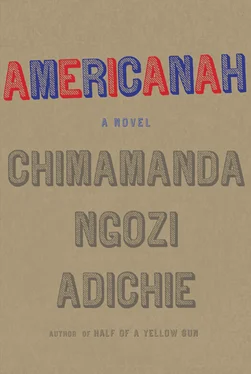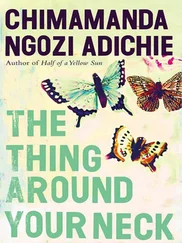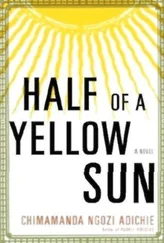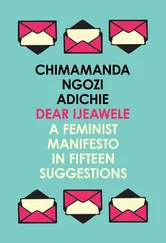“I spent the morning reading The Small Redemptions of Lagos . Scouring it, actually,” he said.
She felt pleased. “What did you think?”
“I liked the Nigerpolitan Club post. A little self-righteous, though.”
“I’m not sure how to take that.”
“As truth,” he said, with that half-raising of an eyebrow that had to be a new quirk; she did not remember him doing it in the past. “But it’s a fantastic blog. It’s brave and intelligent. I love the layout.” There he was again, reassuring her.
She pointed at the compound next door. “Do you recognize that?”
“Ah! Yes.”
“I thought it would be just perfect for the blog. Such a beautiful house and in this kind of magnificent ruin. Plus peacocks on the roof.”
“It looks a little like a courthouse. I’m always fascinated by these old houses and the stories they carry.” He tugged at the thin metal railing of her verandah, as though to check how durable it was, how safe, and she liked that he did that. “Somebody is going to snap it up soon, tear it down, and put up a gleaming block of overpriced luxury flats.”
“Somebody like you.”
“When I started in real estate, I considered renovating old houses instead of tearing them down, but it didn’t make sense. Nigerians don’t buy houses because they’re old. A renovated two-hundred-year-old mill granary, you know, the kind of thing Europeans like. It doesn’t work here at all. But of course it makes sense because we are Third Worlders and Third Worlders are forward-looking, we like things to be new, because our best is still ahead, while in the West their best is already past and so they have to make a fetish of that past.”
“Is it me or are you now given to delivering little lectures?” she asked.
“It’s just refreshing to have an intelligent person to talk to.”
She looked away, wondering if this was a reference to his wife, and disliking him for it.
“Your blog already has such a following,” he said.
“I have big plans for it. I’d like to travel through Nigeria and post dispatches from each state, with pictures and human stories, but I have to do things slowly first, establish it, make some money from advertising.”
“You need investors.”
“I don’t want your money,” she said, a little sharply, keeping her eyes levelly on the sunken roof of the abandoned house. She was irritated by his comment about an intelligent person because it was, it had to be, about his wife, and she wanted to ask why he was telling her that. Why had he married a woman who was not intelligent only to turn around and tell her that his wife was not intelligent?
“Look at the peacock, Ifem,” he said, gently, as though he sensed her irritation.
They watched the peacock walk out of the shadow of a tree, then its lugubrious flight up to its favorite perch on the roof, where it stood and surveyed the decayed kingdom below.
“How many are there?” he asked.
“One male and two females. I’ve been hoping to see the male do its mating dance but I never have. They wake me up in the morning with their cries. Have you heard them? Almost like a child that doesn’t want to do something.”
The peacock’s slender neck moved this way and that, and then, as though it had heard her, it cawed, its beak parted wide, the sounds pouring out of its throat.
“You were right about the sound,” he said, moving closer to her. “Something of a child about it. The compound reminds me of a property I have in Enugu. An old house. It was built before the war, and I bought it to tear it down, but then I decided to keep it. It’s very gracious and restful, big verandahs and old frangipani trees in the back. I’m redoing the interior completely, so it will be very modern inside, but the outside has its old look. Don’t laugh, but when I saw it, it reminded me of poetry.”
There was a boyishness in the way he said “Don’t laugh” that made her smile at him, half making fun of him, half letting him know she liked the idea of a house that had reminded him of poetry.
“I imagine one day when I run away from it all, I’ll go and live there,” he said.
“People really do become eccentric when they become rich.”
“Or maybe we all have eccentricity in us, we just don’t have the money to show it? I’d love to take you to see the house.”
She murmured something, a vague acquiescence.
His phone had been ringing for a while, an endless, dull buzzing in his pocket. Finally he brought it out, glanced at it, and said, “Sorry, I have to take this.” She nodded and went inside, wondering if it was his wife.
From the living room, she heard snatches of his voice, raised, lowered, and then raised again, speaking Igbo, and when he came inside, there was a tightening in his jaw.
“Everything okay?” she asked.
“It’s a boy from my hometown. I pay his school fees but he now has a mad sense of entitlement and this morning he sent me a text telling me he needs a cell phone and could I send it to him by Friday. A fifteen-year-old boy. The gall of it. And then he starts calling me. So I’ve just told him off and I’ve told him his scholarship is off, too, just to scare some sense into his head.”
“Is he related to you?”
“No.”
She waited, expecting more.
“Ifem, I do what rich people are supposed to do. I pay school fees for a hundred students in my village and my mum’s village.” He spoke with an awkward indifference; this was not a subject that he cared to talk about. He was standing by her bookshelf. “What a beautiful living room.”
“Thank you.”
“You shipped all your books back?”
“Most of them.”
“Ah. Derek Walcott.”
“I love him. I finally get some poetry.”
“I see Graham Greene.”
“I started reading him because of your mother. I love The Heart of the Matter .”
“I tried reading it after she died. I wanted to love it. I thought maybe if I could just love it …” He touched the book, his voice trailing away.
His wistfulness moved her. “It’s real literature, the kind of human story people will read in two hundred years,” she said. “You sound just like my mother,” he said.
He felt familiar and unfamiliar at the same time. Through the parted curtains, a crescent of light fell across the living room. They were standing by the bookshelf and she was telling him about the first time she finally read The Heart of the Matter , and he was listening, in that intense manner of his, as though swallowing her words like a drink. They were standing by the bookshelf and laughing about how often his mother had tried to get him to read the book. And then they were standing by the bookshelf and kissing. A gentle kiss at first, lips pressed to lips, then their tongues were touching and she felt boneless against him. He pulled away first.
“I don’t have condoms,” she said, brazen, deliberately brazen.
“I didn’t know we needed condoms to have lunch.”
She hit him playfully. Her entire body was invaded by millions of uncertainties. She did not want to look at his face. “I have a girl who cleans and cooks so I have a lot of stew in my freezer and jollof rice in my fridge. We can have lunch here. Would you like something to drink?” She turned towards the kitchen.
“What happened in America?” he asked. “Why did you just cut off contact?”
Ifemelu kept walking to the kitchen.
“Why did you just cut off contact?” he repeated quietly. “Please tell me what happened.”
Before she sat opposite him at her small dining table and told him about the corrupt-eyed tennis coach in Ardmore, Pennsylvania, she poured them both some mango juice from a carton. She told him small details about the man’s office that were still fresh in her mind, the stacks of sports magazines, the smell of damp, but when she got to the part where he took her to his room, she said, simply, “I took off my clothes and did what he asked me to do. I couldn’t believe that I got wet. I hated him. I hated myself. I really hated myself. I felt like I had, I don’t know, betrayed myself.” She paused. “And you.”
Читать дальше












